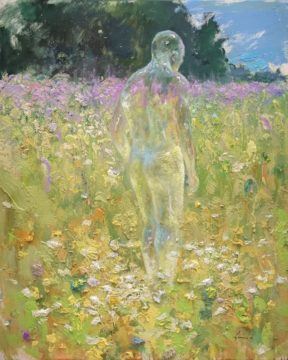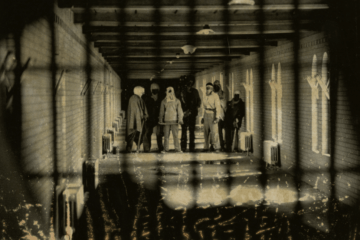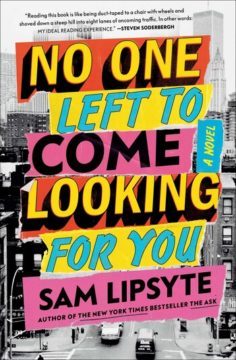Adam Kirsch in The Atlantic:
 Man is an invention of recent date. And one perhaps nearing its end.”
Man is an invention of recent date. And one perhaps nearing its end.”
With this declaration in The Order of Things (1966), the French philosopher Michel Foucault heralded a new way of thinking that would transform the humanities and social sciences. Foucault’s central idea was that the ways we understand ourselves as human beings aren’t timeless or natural, no matter how much we take them for granted. Rather, the modern concept of “man” was invented in the 18th century, with the emergence of new modes of thinking about biology, society, and language, and eventually it will be replaced in turn.
As Foucault writes in the book’s famous last sentence, one day “man would be erased, like a face drawn in the sand at the edge of the sea.” The image is eerie, but he claimed to find it “a source of profound relief,” because it implies that human ideas and institutions aren’t fixed. They can be endlessly reconfigured, maybe even for the better. This was the liberating promise of postmodernism: The face in the sand is swept away, but someone will always come along to draw a new picture in a different style.
More here.

 T
T On a May evening in 1972—eight months after the uprising—Tisdale passed through Attica’s security gates and held his first workshop. He began by asking his students, “What is poetry?” He recorded their answers in his journal: “Personal, deals with emotions, historical, compact (concise), eternal, revolutionary, beauty, rhyme, rhythm, a verbal X-ray of the soul.” Knowing he was under nearly as much scrutiny as the imprisoned men, Tisdale approached the “revolutionary” aspects of poetry with caution. Attica’s administrators feared another revolt. Officers were always present for the workshops; Tisdale’s journal makes special note of the occasions when a Black officer, recruited after the uprising, attended. Regardless of the surveillance, the workshop began to gel after the first few weeks as participants became more comfortable with Tisdale. He noticed quickly that many contributors possessed great skill as poets. They told him that nothing had changed at Attica since the revolt; prison conditions remained abhorrent. They shared an urgency to write about the violence they had witnessed and America’s carceral system in general, and they did not hold back.
On a May evening in 1972—eight months after the uprising—Tisdale passed through Attica’s security gates and held his first workshop. He began by asking his students, “What is poetry?” He recorded their answers in his journal: “Personal, deals with emotions, historical, compact (concise), eternal, revolutionary, beauty, rhyme, rhythm, a verbal X-ray of the soul.” Knowing he was under nearly as much scrutiny as the imprisoned men, Tisdale approached the “revolutionary” aspects of poetry with caution. Attica’s administrators feared another revolt. Officers were always present for the workshops; Tisdale’s journal makes special note of the occasions when a Black officer, recruited after the uprising, attended. Regardless of the surveillance, the workshop began to gel after the first few weeks as participants became more comfortable with Tisdale. He noticed quickly that many contributors possessed great skill as poets. They told him that nothing had changed at Attica since the revolt; prison conditions remained abhorrent. They shared an urgency to write about the violence they had witnessed and America’s carceral system in general, and they did not hold back. ONE OF SAM LIPSYTE’S SIGNATURE ACCOMPLISHMENTS has been to find the baroque musicality in the emergent vocabularies—commercial, bureaucratic, wellness-industrial, pornographic—opened up by twenty-first-century English. “Hark would shepherd the sermon weirdward,” he writes in his 2019 novel about an entrepreneurial inspirational speaker, “the measured language fracturing, his docile flock of reasonable tips for better corporate living driven off the best practices cliff, the crowd in horrified witness.” Across his first six books, Lipsyte’s sentences have been excessive, pun-laden, and lyrically raunchy. When language threatens to sound measured, a character with a zany name can be counted on to fracture it.
ONE OF SAM LIPSYTE’S SIGNATURE ACCOMPLISHMENTS has been to find the baroque musicality in the emergent vocabularies—commercial, bureaucratic, wellness-industrial, pornographic—opened up by twenty-first-century English. “Hark would shepherd the sermon weirdward,” he writes in his 2019 novel about an entrepreneurial inspirational speaker, “the measured language fracturing, his docile flock of reasonable tips for better corporate living driven off the best practices cliff, the crowd in horrified witness.” Across his first six books, Lipsyte’s sentences have been excessive, pun-laden, and lyrically raunchy. When language threatens to sound measured, a character with a zany name can be counted on to fracture it.